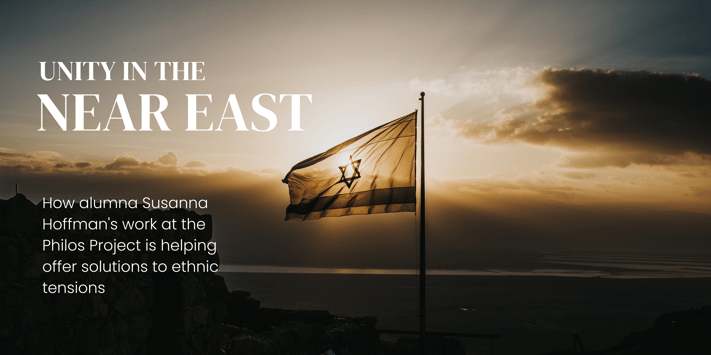
She looked around the room filled with representatives from across the Near East. She couldn’t believe it. She was helping change the world. Alumna Susanna Hoffman (Journalism ’21) was in Athens, Greece, at the first Abraham's Missing Child Initiative summit. Just weeks earlier, she visited Israel and the United Arab Emirates. She was living her dream of traveling, but with greater purpose: she was helping to unite the world.
Patrick Henry College has a three-fold educational goal: to pursue high academic rigor, fidelity to the American founding, and an unwavering biblical worldview. Hoffman, a Journalism major with the classical liberal arts track, graduated from PHC knowing she wanted to travel, learn, and grow. When she stumbled upon the Philos Project, she knew she had found her perfect first job out of school.
The organization, which focuses on protecting Christianity within the Near East, strengthens Jewish-Christian relations and promotes pluralism within minority communities. They have leadership programs to educate Christians about leadership, advocacy and the Near East; an action league to fight antisemitism in America; and advocacy initiatives that work to promote pluralism in Near Eastern communities.
Hoffman first heard about the Philos Project from Passages, an organization that sponsors trips to Israel for students in order to help them strengthen the foundation of their Christian faith. Hoffman joined the Passages trip to Israel in partnership with PHC the summer after her freshman year. She also grew up in a very pro-Israel home and knew much about the land’s history but said that experiencing Israel personally was surreal, giving her a more nuanced view.
Though she had discovered the Philos Project early in college, she did not think about it much until she graduated. It was then that she reconnected with another alumna who connected her with the organization. “The statements about PHC’s network being helpful was completely true,” Hoffman said. “Having that recommendation [from the alumna] was great.”
While studying political journalism at PHC, Hoffman’s interests slowly drifted from politics to human rights. She soon became interested in moving to Israel to study the Jewish-Palestinian conflict. This interest translated into her career in a way only God could have orchestrated. When presented with the opportunity to work for the Philos Project, Hoffman knew it would be a perfect fit. “It’s such an accepting place to have intellectual and gracious conversations. Everyone is pluralistically minded; they all want to understand the complexity of issues,” Hoffman said..jpg?width=397&height=286&name=Hoffman_Athens%2c%20Greece%20(copy).jpg)
The Philos Project gave Hoffman the chance to travel to Israel, to interview a Holocaust survivor, and to be a part of the Abraham’s Missing Child Initiative in Athens, Greece. The goal of this initiative is to create a list of ways that governments in the Middle East can better treat minority groups. The Philos Project hopes to strengthen the weaker Christian groups and create a better relationship between the three Abrahamic faiths: Christianity, Judaism, and Islam. The meeting in Athens drafted the list of recommendations, which will later be reviewed with Muslim and Jewish leaders and then given to the governments.
Hoffman’s primary job at the Philos Project is to run all the social media accounts. She builds engagement and informs people via social media about Philos Project and its mission. Though she works remotely, she is still able to attend all the organization’s events, travel, and visit their New York office every two or three months.
Despite her love as the social media director for the group, she hopes to be able to write more articles in the future. She credits her love and skill for writing to PHC and her marketing skills from her internships. “There is so much you learn from classes, but they don’t always fill everything. That’s where internships come in,” Hoffman said.
By working at the Philos Project, Hoffman said she has both gained a greater knowledge about the Middle East and developed a pluralist mindset. “Realistically, we are not going to change these cultures and traditions,” Hoffman stated. “We need dialogue and education surrounding this history because it’s our history too.”
.jpg?width=714&height=476&name=Hoffman_Dubai%2c%20UAE%20(copy).jpg)





